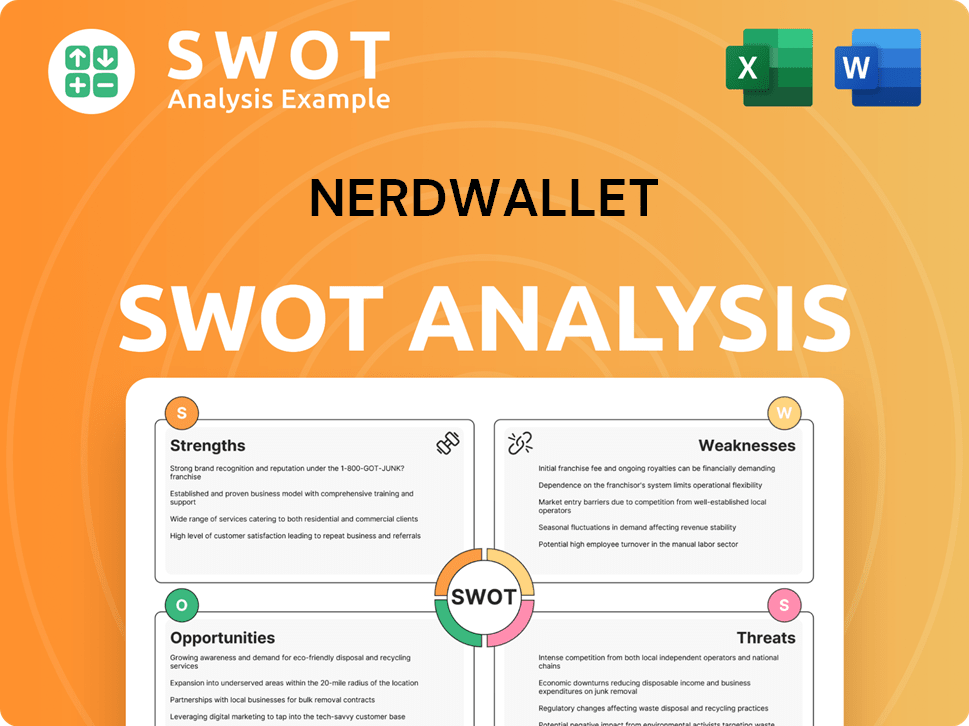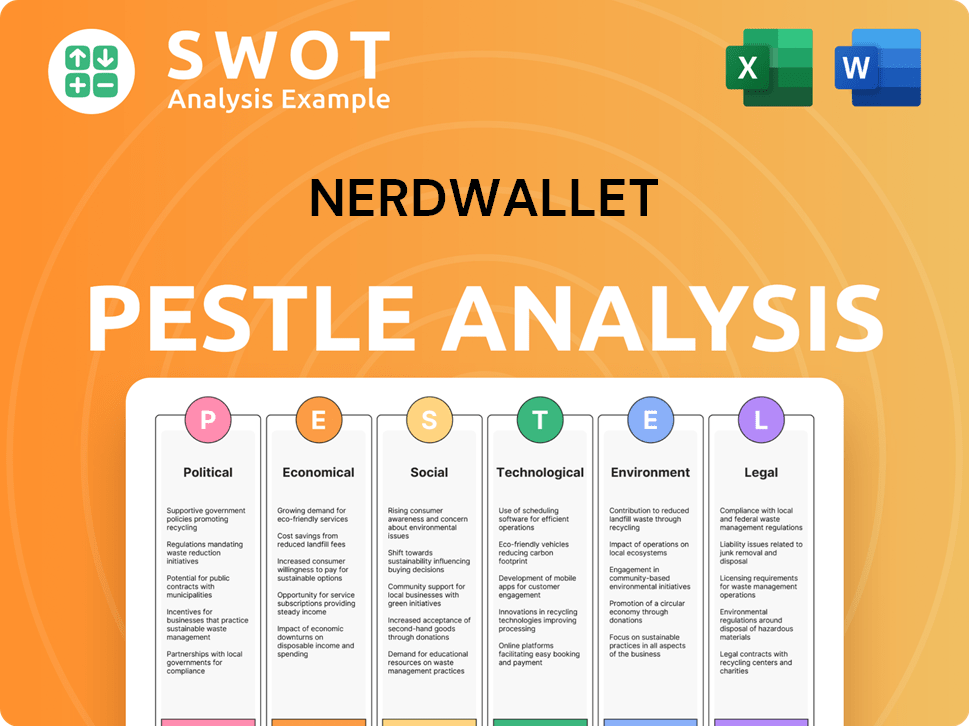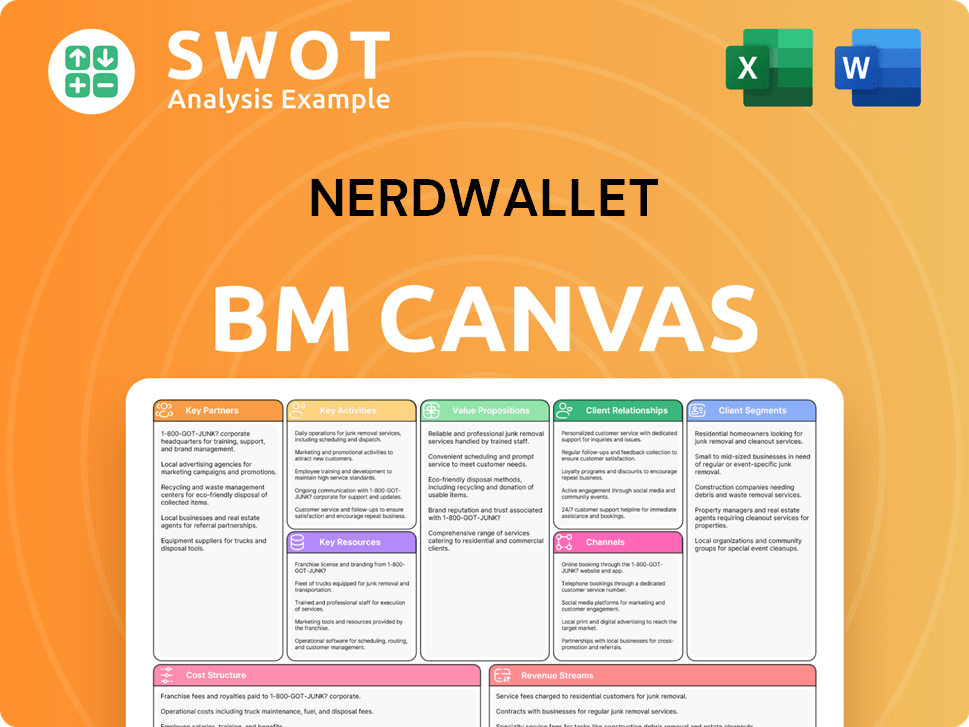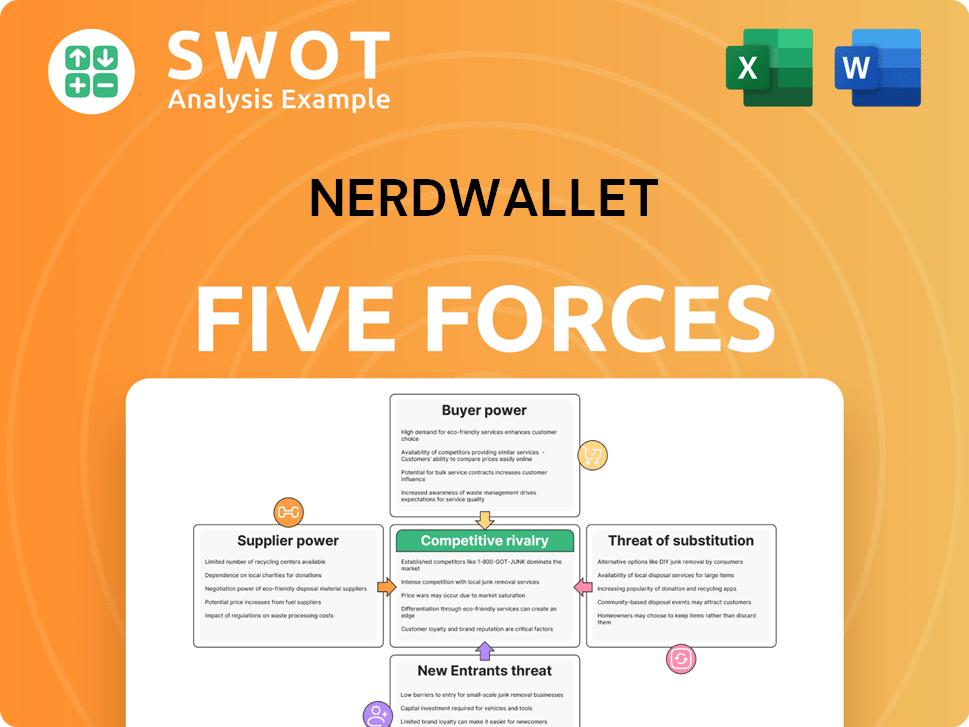NerdWallet Bundle
Who Really Owns NerdWallet?
Ever wondered about the forces shaping the financial advice you receive? The NerdWallet SWOT Analysis reveals the inner workings of this financial powerhouse. Understanding the NerdWallet ownership structure is key to grasping its strategic direction and its commitment to consumers. From its humble beginnings to its current status, the ownership journey of NerdWallet is a fascinating tale.

The evolution of NerdWallet from a startup to a publicly traded company offers valuable insights into its governance and future. Exploring "Who owns NerdWallet" unveils the influence of its founders, Tim Chen and Jake Gibson, early investors, and the broader public. Knowing "Who owns NerdWallet company" is essential for anyone looking to understand the company's long-term vision and its place in the competitive fintech landscape. This exploration will examine the NerdWallet investors and the impact of the IPO.
Who Founded NerdWallet?
The financial website, NerdWallet, was established in 2009. The company was founded by Tim Chen and Jake Gibson. Chen, a former hedge fund analyst, came up with the idea after his sister had trouble finding reliable credit card information.
Jake Gibson, who also had a background in financial services, joined Chen to co-found the company. Initially, the company was self-funded, relying on the founders' personal capital. This approach allowed Chen and Gibson to retain significant control and equity in the early stages of the company.
The initial equity split between Chen and Gibson is not publicly detailed. However, it is common for co-founders of bootstrapped startups to hold substantial stakes. The absence of early institutional investors meant that the founders had complete autonomy over the company's direction and strategy. The early ownership structure reflected the founders' vision of building a consumer-centric financial platform without immediate pressure from outside investors.
The early ownership of the NerdWallet company was primarily held by its founders, Tim Chen and Jake Gibson.
- The company was bootstrapped, meaning it was initially funded by the founders' personal capital.
- This allowed Chen and Gibson to maintain significant control and equity.
- There were no significant early external investors.
- This ownership structure supported the founders' vision of a consumer-focused financial platform.
NerdWallet SWOT Analysis
- Complete SWOT Breakdown
- Fully Customizable
- Editable in Excel & Word
- Professional Formatting
- Investor-Ready Format

How Has NerdWallet’s Ownership Changed Over Time?
The ownership structure of the company, now known as NerdWallet, saw a major shift with its initial public offering (IPO) on November 4, 2021. The company began trading on the Nasdaq Global Select Market under the ticker symbol 'NRDS'. The IPO involved the offering of 7,250,000 shares of Class A common stock at a price of $18.00 per share. This move transitioned the company from a privately held entity to a publicly traded one, significantly broadening its ownership base.
The IPO was a pivotal moment in the company's history, reshaping its ownership dynamics and introducing a diverse group of investors. This event marked a significant change in the company's financial landscape, opening it up to a wider range of investment opportunities and public scrutiny. The shift also impacted the company's governance structure, as it now had to adhere to the regulations and reporting requirements of a publicly traded entity.
| Event | Date | Impact on Ownership |
|---|---|---|
| Initial Public Offering (IPO) | November 4, 2021 | Transitioned from private to public ownership; diversified shareholder base. |
| Stock Trading Commencement | November 4, 2021 | Shares available for public trading on the Nasdaq Global Select Market. |
| Ongoing Institutional Investment | Early 2024 | Institutional investors like Vanguard and BlackRock hold significant shares. |
As of early 2024, the major stakeholders in the company include a mix of institutional investors, mutual funds, and individual insiders. Institutional ownership is substantial, with firms like Vanguard Group Inc. and BlackRock Inc. holding significant percentages of the company's shares. For instance, as of March 31, 2024, The Vanguard Group, Inc. reported holding 7.97% of the company's shares, and BlackRock Inc. held 5.09% as of the same date. The founders, Tim Chen and Jake Gibson, continue to hold significant stakes, primarily through their ownership of Class B common stock. This dual-class share structure allows the founders to retain substantial voting power and control over the company's strategic direction. For more insights, you can explore the Target Market of NerdWallet.
The company's ownership structure is a blend of institutional and insider holdings.
- Founders retain significant influence through dual-class shares.
- Institutional investors like Vanguard and BlackRock are major shareholders.
- The IPO in 2021 marked a shift to public ownership.
- Understanding the ownership structure helps in evaluating the company's strategic direction.
NerdWallet PESTLE Analysis
- Covers All 6 PESTLE Categories
- No Research Needed – Save Hours of Work
- Built by Experts, Trusted by Consultants
- Instant Download, Ready to Use
- 100% Editable, Fully Customizable

Who Sits on NerdWallet’s Board?
The current Board of Directors of the NerdWallet company plays a crucial role in its governance, balancing the interests of various shareholder groups. As of early 2024, the board includes a mix of founders, representatives of major shareholders, and independent directors. Tim Chen, co-founder and CEO, serves as the Chairman of the Board, indicating the continued strong influence of the founding team. Jake Gibson, co-founder, also holds a board seat.
The board's composition reflects a blend of experience and perspectives, aiming to guide the company's strategic direction and ensure effective oversight. The presence of both founders and independent directors is typical for a publicly traded company, designed to provide a balance between insider knowledge and external perspectives. The specific details of the board members and their affiliations can be found in the company's filings, such as the proxy statements.
| Board Member | Title | Affiliation |
|---|---|---|
| Tim Chen | Co-founder, CEO, Chairman | NerdWallet |
| Jake Gibson | Co-founder | NerdWallet |
| Other Directors | Independent Directors and Representatives | Varies |
NerdWallet employs a dual-class share structure, which significantly impacts voting power. Class A common stock, held by public shareholders, carries one vote per share. In contrast, Class B common stock, primarily held by the founders and certain early investors, carries ten votes per share. This structure grants disproportionate voting control to the holders of Class B shares, ensuring that Tim Chen and Jake Gibson, along with other early stakeholders, maintain significant influence over major corporate decisions, including the election of directors, mergers and acquisitions, and other strategic initiatives. This Competitors Landscape of NerdWallet provides more context.
NerdWallet's ownership structure is designed to balance founder control with public market participation. The dual-class share structure gives founders and early investors significant voting power. This structure helps maintain a long-term vision.
- Class A shares: One vote per share.
- Class B shares: Ten votes per share.
- Founders and early investors hold the majority of Class B shares.
- This structure influences major corporate decisions.
NerdWallet Business Model Canvas
- Complete 9-Block Business Model Canvas
- Effortlessly Communicate Your Business Strategy
- Investor-Ready BMC Format
- 100% Editable and Customizable
- Clear and Structured Layout

What Recent Changes Have Shaped NerdWallet’s Ownership Landscape?
In the past few years, the transition of the company from a private to a public entity has significantly reshaped its ownership landscape. Following its IPO in November 2021, shares became accessible to a wider array of investors, including both institutional and individual entities. This shift diluted the direct ownership percentage of the founders and early private investors, although their voting power remains substantial due to the dual-class share structure.
Recent trends in NerdWallet's ownership reflect a pattern common among newly public tech companies. Institutional ownership has been on the rise. As of early 2024, major asset managers like Vanguard and BlackRock have increased their stakes, indicating growing confidence in the company's market position and future prospects. This accumulation by institutional investors is a common trend, as passive index funds and actively managed funds seek exposure to established players in the fintech sector. The company's focus has been on organic growth and expanding its product offerings.
The dual-class share structure is expected to remain in place, preserving the founders' control. This structure insulates the company from potential hostile takeovers or significant activist investor pressure. This approach aligns with a broader trend among tech companies to maintain founder control post-IPO. As of early 2025, there have been no major public announcements regarding significant share buybacks or secondary offerings by the company. Leadership changes have seen some evolution within the executive team, but the founders, particularly Tim Chen, remain at the helm, ensuring continuity in strategic direction.
Institutional investors, such as Vanguard and BlackRock, have increased their stakes in the company. This indicates growing confidence in the company's future. The company's shares are now accessible to a broader range of investors, including both institutional and individual entities.
The founders, particularly Tim Chen, remain at the helm, ensuring continuity in strategic direction. The dual-class share structure preserves the founders' control. This structure helps to insulate the company from potential hostile takeovers or significant activist investor pressure.
NerdWallet Porter's Five Forces Analysis
- Covers All 5 Competitive Forces in Detail
- Structured for Consultants, Students, and Founders
- 100% Editable in Microsoft Word & Excel
- Instant Digital Download – Use Immediately
- Compatible with Mac & PC – Fully Unlocked

Related Blogs
- What are Mission Vision & Core Values of NerdWallet Company?
- What is Competitive Landscape of NerdWallet Company?
- What is Growth Strategy and Future Prospects of NerdWallet Company?
- How Does NerdWallet Company Work?
- What is Sales and Marketing Strategy of NerdWallet Company?
- What is Brief History of NerdWallet Company?
- What is Customer Demographics and Target Market of NerdWallet Company?
Disclaimer
All information, articles, and product details provided on this website are for general informational and educational purposes only. We do not claim any ownership over, nor do we intend to infringe upon, any trademarks, copyrights, logos, brand names, or other intellectual property mentioned or depicted on this site. Such intellectual property remains the property of its respective owners, and any references here are made solely for identification or informational purposes, without implying any affiliation, endorsement, or partnership.
We make no representations or warranties, express or implied, regarding the accuracy, completeness, or suitability of any content or products presented. Nothing on this website should be construed as legal, tax, investment, financial, medical, or other professional advice. In addition, no part of this site—including articles or product references—constitutes a solicitation, recommendation, endorsement, advertisement, or offer to buy or sell any securities, franchises, or other financial instruments, particularly in jurisdictions where such activity would be unlawful.
All content is of a general nature and may not address the specific circumstances of any individual or entity. It is not a substitute for professional advice or services. Any actions you take based on the information provided here are strictly at your own risk. You accept full responsibility for any decisions or outcomes arising from your use of this website and agree to release us from any liability in connection with your use of, or reliance upon, the content or products found herein.